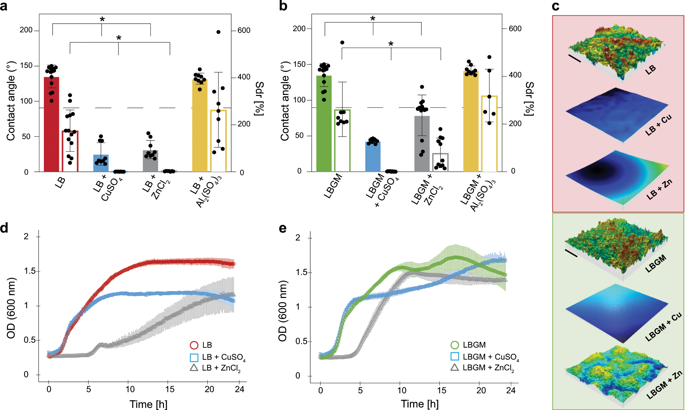当前位置:
X-MOL 学术
›
npj Biofilms Microbiomes
›
论文详情
Our official English website, www.x-mol.net, welcomes your
feedback! (Note: you will need to create a separate account there.)
Metal ions weaken the hydrophobicity and antibiotic resistance of Bacillus subtilis NCIB 3610 biofilms.
npj Biofilms and Microbiomes ( IF 7.8 ) Pub Date : 2020-01-03 , DOI: 10.1038/s41522-019-0111-8 Carolina Falcón García 1 , Martin Kretschmer 1 , Carlos N Lozano-Andrade 2 , Markus Schönleitner 1 , Anna Dragoŝ 2 , Ákos T Kovács 2 , Oliver Lieleg 1
npj Biofilms and Microbiomes ( IF 7.8 ) Pub Date : 2020-01-03 , DOI: 10.1038/s41522-019-0111-8 Carolina Falcón García 1 , Martin Kretschmer 1 , Carlos N Lozano-Andrade 2 , Markus Schönleitner 1 , Anna Dragoŝ 2 , Ákos T Kovács 2 , Oliver Lieleg 1
Affiliation

|
Surface superhydrophobicity makes bacterial biofilms very difficult to fight, and it is a combination of their matrix composition and complex surface roughness which synergistically protects these biomaterials from wetting. Although trying to eradicate biofilms with aqueous (antibiotic) solutions is common practice, this can be a futile approach if the biofilms have superhydrophobic properties. To date, there are not many options available to reduce the liquid repellency of biofilms or to prevent this material property from developing. Here, we present a solution to this challenge. We demonstrate how the addition of metal ions such as copper and zinc during or after biofilm formation can render the surface of otherwise superhydrophobic B. subtilis NCIB 3610 biofilms completely wettable. As a result of this procedure, these smoother, hydrophilic biofilms are more susceptible to aqueous antibiotics solutions. Our strategy proposes a scalable and widely applicable step in a multi-faceted approach to eradicate biofilms.
中文翻译:

金属离子削弱枯草芽孢杆菌 NCIB 3610 生物膜的疏水性和抗生素耐药性。
表面超疏水性使得细菌生物膜很难对抗,而它们的基质成分和复杂的表面粗糙度的结合可以协同保护这些生物材料免受润湿。尽管尝试用水(抗生素)溶液根除生物膜是常见的做法,但如果生物膜具有超疏水特性,这可能是徒劳的方法。迄今为止,没有太多选择可以降低生物膜的拒液性或防止这种材料特性的发展。在这里,我们提出了应对这一挑战的解决方案。我们演示了在生物膜形成期间或之后添加铜和锌等金属离子如何使原本超疏水的枯草芽孢杆菌 NCIB 3610 生物膜表面完全可润湿。这一过程的结果是,这些更光滑、亲水的生物膜更容易受到抗生素水溶液的影响。我们的战略提出了一个可扩展且广泛适用的步骤,以多方面的方法消除生物膜。
更新日期:2020-01-03
中文翻译:

金属离子削弱枯草芽孢杆菌 NCIB 3610 生物膜的疏水性和抗生素耐药性。
表面超疏水性使得细菌生物膜很难对抗,而它们的基质成分和复杂的表面粗糙度的结合可以协同保护这些生物材料免受润湿。尽管尝试用水(抗生素)溶液根除生物膜是常见的做法,但如果生物膜具有超疏水特性,这可能是徒劳的方法。迄今为止,没有太多选择可以降低生物膜的拒液性或防止这种材料特性的发展。在这里,我们提出了应对这一挑战的解决方案。我们演示了在生物膜形成期间或之后添加铜和锌等金属离子如何使原本超疏水的枯草芽孢杆菌 NCIB 3610 生物膜表面完全可润湿。这一过程的结果是,这些更光滑、亲水的生物膜更容易受到抗生素水溶液的影响。我们的战略提出了一个可扩展且广泛适用的步骤,以多方面的方法消除生物膜。











































 京公网安备 11010802027423号
京公网安备 11010802027423号